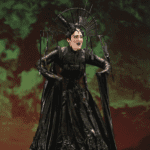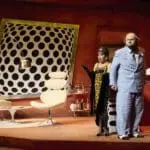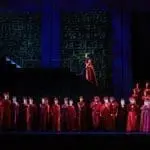A week after the opening of Nabucco, on Friday, October 11th, the Canadian Opera Company presented its second opera of the fall season, Charles Gounod’s Faust, to an enthusiastic audience at the Four Seasons Centre.
Based on Goethe’s original poem, the Gounod opera depicts the aging poet Faust entering into a contract with the devil Méphistophélès, giving up his soul in exchange for his lost youth and the love of Marguerite. The fantastical tale and the melodically inspired score made Faust an instant hit in its time. Since its premiere in Paris in 1859, Gounod’s Faust has become one of the most beloved of all French operas, second only to Bizet’s Carmen based on performance statistics. According to Operabase, Faust is in 34th place amongst all operas with a total of 4,025 performances in 1,015 productions worldwide since 1996 when Operabase started collecting data.
Faust’s popularity, however, has been in decline since the mid 20th century. It’s been theorized that, by current societal norms, Faust the morality tale is considered quaint, at best, if not hopelessly old fashioned. Be that as it may, the music is glorious and with a good performance, it’s a terrific night out at the opera. The COC staged Faust for the first time in its second season in 1951. It was subsequently revived in five more seasons, the last time in 2007, a good 17 years ago. It’s certainly time to revisit this wonderful opera.
The COC has assembled a superb cast, led by two singers new to Toronto audiences, tenor Long Long (Faust) and soprano Guanqun Yu (Marguerite). On opening night, Long sang with a splendid lyric tenor of volume and beauty, a totally secure top, with a plangent top C in his big aria. Also of note was his ability to toss off a high B diminuendo, something that few tenors dare to attempt. Yu’s beautiful lyric soprano was ideal as Marguerite, and her Jewel Song was a pleasure to the ear.
American bass-baritone Kyle Ketelsen made a welcome return to the COC as Méphistophélès. His bass-baritone has warmth and expressivity, and his Devil is almost likable – one even wishes for a bit more bite, more menace in his characterization. His laughter in “Vous, qui faites l’endormie” wasn’t quite sinister enough in my book.
Polish baritone Szymon Mechliński made his COC debut as Valentin, singing with solid, sturdy tone. Former Ensemble Studio member Alex Hetherington’s high mezzo has just the right sound for the lovesick Siebel, while baritone Korin Thomas-Smith (Wagner) took full advantage of his few moments in the spotlight. Megan Latham brought just the perfect mix of character mezzo and humour into her cameo as Marthe.
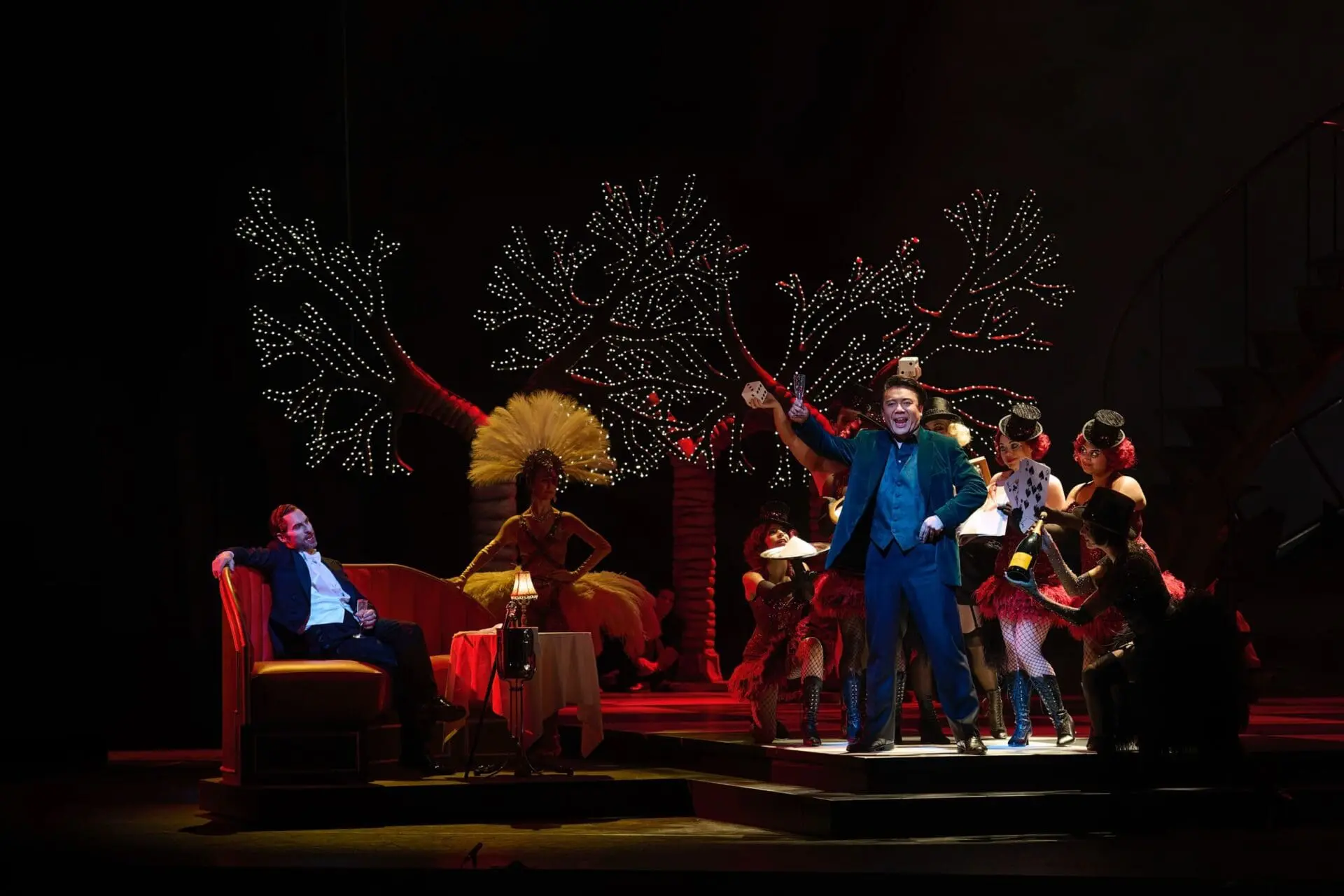
Photo Credit: Michael Cooper
Long Long as Faust enjoying the spoils of his bargain
I heard a rumour that this was COC music director Johannes Debus’s first Faust. If indeed it’s true, there’s absolutely no hint that he’s a Faust newbie. He led the orchestra in a completely well judged, idiomatic performance, as if he had conducted this piece a thousand times. And it was great to hear the COC Chorus sounding wonderful yet again after the huge workout on the Nabucco opening.
This new production, directed by Amy Lane, could be considered an example of “Regieoper,” a German term for director-driven opera. Instead of taking an essentially libretto-based representational approach, Regieoper is director-centric, which may be at variance with the composer’s and librettist’s original intention. Based on my opera-going experience in Europe, it’s fair to say that Regieoper is the norm there and the exception here, although it’s becoming more prevalent on this side of the Atlantic.
In a Q&A in the printed program, Amy Lane explains that her approach is more fantastical and symbolic than realistic or representational. The unit set, designed by Emma Ryott, consists of a projected image of a chest x-ray, five stylized trees that look like inverted bronchial tubes, and a spiral staircase resembling a twisted spine, all supposed to symbolize Faust the person. The stage floor is made to resemble a chessboard, symbolising Faust’s gamble with the Devil.
These design details, while visually striking and often intriguing, are a departure from the representational approach, typically Faust’s study in Act One, Marguerite’s Garden in Act Two and so on. It results in a visual and conceptual dissonance between what one sees and what’s in the text. It can make the staging awkward and less effective, as in the case of Marguerite’s reaction to the jewels and her beautiful aria.
Lane has also introduced a huge contingent of wordless characters, dancers and other supers, presumably to liven up the proceedings. With all the extraneous actions added onto the opera, there were moments when I felt I was watching a Broadway musical! To be honest, it distracts the audience from focusing on the fabulous score, which is why we were there in the first place. That said, the Regie treatment of this Faust is quite mild compared to those in European opera houses. Lane’s vision is essentially faithful to and respectful of the creators’ wishes, without tinkering the plot or altering the music or the relationships of the characters in any way.
At the end of the day, one attends Faust for its incredible music, and this COC performance was an immensely satisfying musical experience.
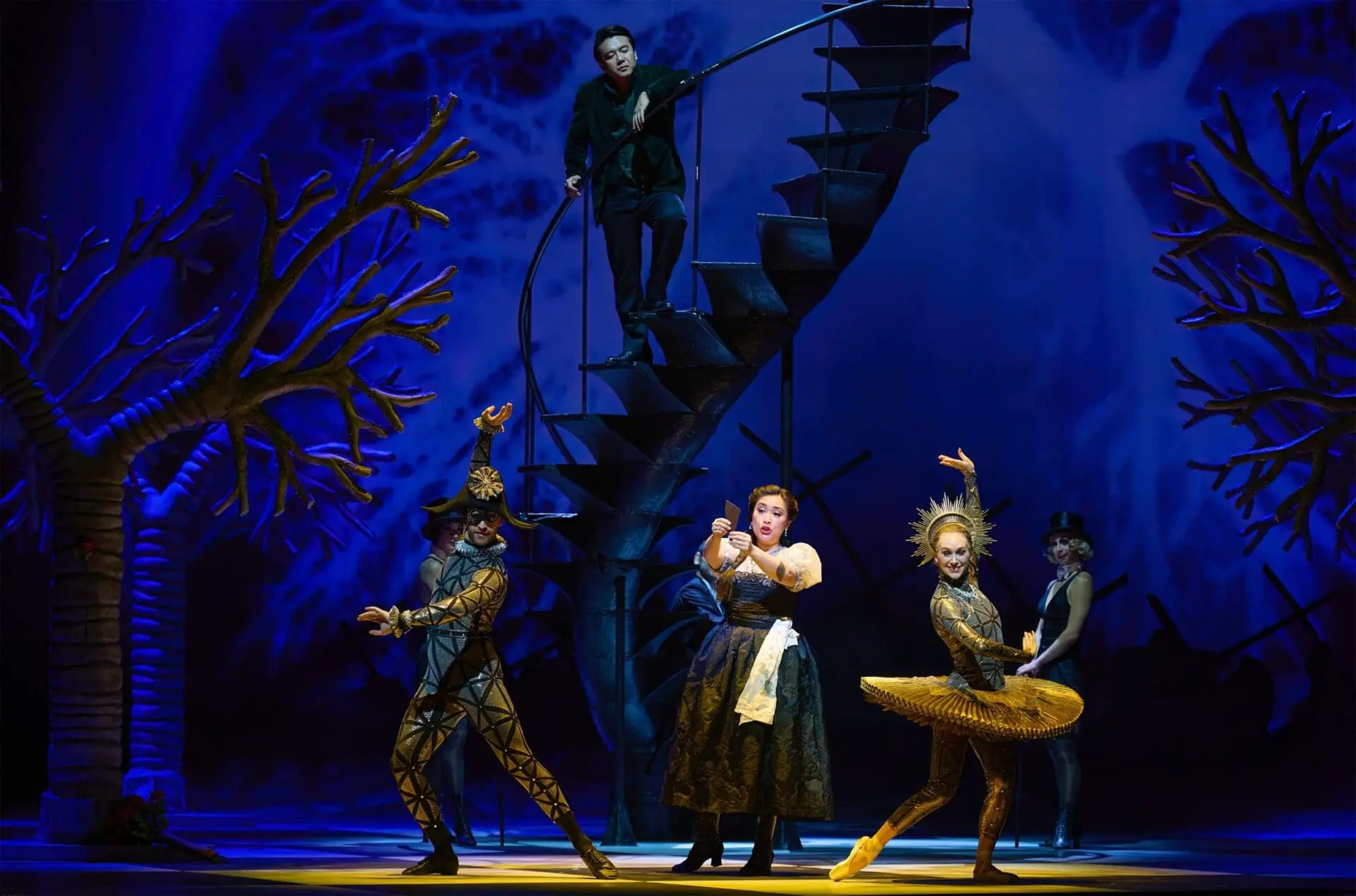
Photo Credit: Michael Cooper
Marguerite (Guanqun Yu) singing the Jewel Song
Opera Canada depends on the generous contributions of its supporters to bring readers outstanding, in-depth coverage of opera in Canada and beyond. Please consider subscribing or donating today.



